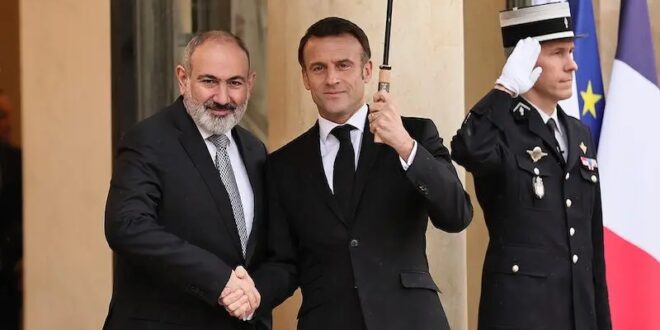French President Emmanuel Macron recently caused a kerfuffle over Ukraine, dropping a bombshell suggestion that NATO troops could be deployed in the Russian-Ukrainian war. Over in the South Caucasus, garnering far less attention in the West, French actions are also stirring tension.
While Atlantic Alliance allies quickly shot down Macron’s troop deployment trial balloon, French diplomacy in the Caucasus, specifically in recent months moves to bolster military cooperation with Armenia, is flying under the West’s radar. But it is not escaping the notice of Azerbaijan, which is striving to freeze Paris out of the ongoing Armenian-Azerbaijani peace process.
France has traditionally been Armenia’s strongest supporter within the European Union, and Armenian Prime Minister Nikol Pashinyan met with Macron in France in late February to reaffirm the close, bilateral relationship.
Talking to reporters after the meeting, Macron reiterated his country’s support “for Armenia, its independence, territorial integrity, democratic process and peaceful aspirations.” He later described Azerbaijan’s use of force in a February 13 exchange of gunfire along the Armenian-Azerbaijani border as “disproportionate.” Four Armenian soldiers died in the firefight.
Macron also called on Azerbaijan to honor a World Court ruling to ensure the safe return to Nagorno-Karabakh of any Armenian refugee who wanted to do so. He additionally placed the onus on Azerbaijan for reducing lingering military tension following Azerbaijan’s reconquest of Karabakh in 2023. Baku has been pressuring Armenia to permit a land corridor to connect Azerbaijan proper to its Nakhchivan exclave, a move that in effect would give Azerbaijan extraterritorial rights on Armenian territory.
“I think it is more than necessary for Azerbaijan to dispel any ambiguity regarding the territorial integrity of Armenia, as far as maps are concerned, then conscientious work should be done for border delimitation and demarcation, which will serve as a basis for the withdrawal of forces from both sides of the border,” Macron said.
Armenia’s defeat in the Karabakh conflict sparked a souring of Yerevan’s relations with Russia, which had long been viewed by Armenians as their primary protector. The falling out with Russia, in turn, has heightened the importance of Yerevan’s relationship with France. Since Azerbaijan completed its takeover of Karabakh last fall, France has concluded a variety of military assistance deals with Armenia, including providing armored vehicles, arms, equipment and munitions, as well as improving air-defense capabilities. Officials have stressed that the assistance is defensive in nature.
On a visit to Yerevan on February 23, French Defense Minister Sébastien Lecornu said helping Armenia was a foreign policy “priority” for France. “It is because Armenia needs us right now that we’re here,” Lecornu told reporters. France’s support, stated Armenian Defense Minister Suren Papikyan, “means we can look forward to long-term planning in the years ahead.”
Pashinyan, in an interview with the France24 television channel, alleged that Azerbaijan is intent on further territorial conquests, noting that Azerbaijani officials have not officially recognized the current frontier between the two states. Given the statements coming out of Baku, Pashinyan said in the interview, “we come to the conclusion that, yes, an attack on Armenia is very likely.”
Germany hosted peace talks involving the Armenian and Azerbaijani foreign ministers on February 28. The talks did not produce tangible signs of progress on a settlement, but pro-government media outlets in Baku did not waste an opportunity to take a swipe at France, promoting the idea that Paris is biased and cannot be part of the peace process. At the same time, Azerbaijani state media cast Germany as an honest broker.
“Germany has offered to expand cooperation while maintaining its neutrality,” stated a commentary published by the pro-government outlet, Report.az “Germany can be an alternative to France. The German government can strengthen relations and its position in the South Caucasus. Azerbaijan gives Germany this chance in the region.”
More broadly, Baku has bristled at what it portrays as French meddling. The Azerbaijani Foreign Ministry labeled Macron’s comments on the February 13 firefight as “unacceptable.” The ministry statement went on to accuse Paris of holding a diplomatic double-standard, pointing out that Paris did not speak out “against Armenian aggression and the occupation of Azerbaijani territories for almost 30 years, as well as the continuing occupation of 8 villages of Azerbaijan by Armenia.”
France was one of the three co-chairs, along with the United States and Russia, that led the OSCE Minsk group, which provided a framework for the peace process from the end of the first conflict in the 1990s until 2020. During that time, Armenian forces controlled Karabakh and surrounding Azerbaijani regions. Today, Azerbaijani leader Ilham Aliyev seems to harbor particular animus for Macron.
“I had the opportunity to communicate quite closely with President [Jacques] Chirac, President [Nicolas] Sarkozy and President [Francois] Hollande, and our relations were quite balanced, quite friendly,” Aliyev said at a CIS summit in 2022. “We always perceived the activities of previous French presidents, despite, of course, a certain factor of the Armenian diaspora in France, as balanced. However, the current French leadership has effectively crossed out all this.”
 Eurasia Press & News
Eurasia Press & News




